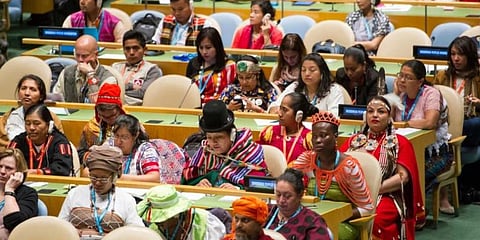

Adivasi rights activists have criticised India’s representative at the United Nations Permanent Forum on Indigenous Issues (UNPFII) for stating that the concept of ‘indigenous people’ was not applicable in the Indian context.
They told Down To Earth that the statement, along with disclaimers given by the government that India had tribal and not indigenous people, was “pure wordplay” and that the Centre’s argument made no sense at all.
India’s representative had stated during the General Discussion at the 22nd session of the UNPFII that the issue of indigenous rights pertained to people in countries who are regarded as indigenous “on account of their descent from the populations which inhabited the country or a geographical region to which the country belongs at the time of conquest or colonisation or the establishment of present state boundaries”.
These people, irrespective of their legal status, retain some or all of their own social, economic, cultural and political institutions.
He noted that this was precisely the definition used in the International Labour Organization Convention 169 of 1989.
“Consistent with this definition, we regard the entire population of India at the time of our independence and their successors to be indigenous. Therefore, the concept of indigenous people is not applicable in India’s context,” the representative added.
Sanjay Basu Malik, director of Jharkhand Jungle Bachao Aandolan, told DTE that the Indian government had ratified the International Declaration of the Rights of Indigenous Peoples passed by the UN in 2007.
“The Centre’s position that there are tribal and not indigenous people in India has often been challenged and criticised strongly. But the Union government hasn’t yet paid any heed to the disagreement expressed by indigenous groups,” he added.
CR Bijoy, an independent researcher on policy and forest rights, told DTE that the UN’s understanding of the concept of indigenous peoples is not based on the ILO 169 definition.
“It is based upon the fact that different geographies have had different processes and histories across time. Every country, in some form or the other, has been colonised. In the Indian context, if the cut off period is pre-Aryan invasion, then the people who were there before Aryans could be understood to be indigenous,” Bijoy added.
Colonisation, as emphasised by the government, cannot necessarily be European colonisation, he pointed out. Hence, the argument put forward by the Centre did not make any sense.
If the government’s position is that “all Indians are indigenous people”, then it should not have any objection to the Scheduled Tribes (STs) being called indigenous people.
“But they do say STs are not indigenous people. So, are you saying that STs in the country are not Indians?” Bijoy asked.
“Second, elements related to indigenous people in international law are found in Indian laws specific to STs. International bank projects like World Bank and the Asian Development Bank say that for India’s STs, indigenous people operative applies and in that case, to receive international funds, our government does sign the documents stating so,” he added.
Bijoy also noted that the term ‘Adivasi’ translated to ‘First or Indigenous People’.
The UNPFII meet, the largest international annual gathering of indigenous people, was held in New York City from April 17-28.
Indigenous Peoples, human health, planetary and territorial health and climate change: a rights-based approach was the priority theme of the event this year.
Delegates discussed the 2030 Agenda for Sustainable Development adopted by the UN General Assembly on September 25, 2015 during the course of the event.
There were also discussions on Indigenous women and Convention on the Elimination of All Forms of Discrimination Against Women, indigenous languages, as well as the UN Indigenous Mechanisms, and the future work of the Forum.
“Indigenous women and girls are … best positioned to uplift the needs of their communities and advance climate crisis solutions. If we do not empower women everywhere as innovators and leaders, our global climate goals cannot proceed,” said US Secretary of Interior Deb Haaland at the event proceedings.
But the Indian representative raised concerns over “the misuse of such forums”.
“We would like to underline that this concept (indigenous people) cannot be expanded to create artificial divides by including societies where diverse ethnic groups have lived together for thousand years. It is regrettable that some individuals continuously misuse this Forum and side events for their selfish agenda, which is a matter of grave concern. We refute all their assertions,” he stated.